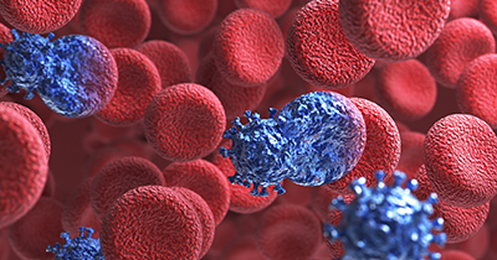Human Immunodeficiency Virus (HIV) is a virus that attacks the body's immune system. The virus attaches to CD-4 cells (immune cells, aka. T-cells) and destroys them, and at the same time it replicates itself. So as the number of virus increases, the number or immune cells decreases. As the number of immune cells decreases, the immune system gets weaker and weaker, and it gets more difficult to fight off other infections. Once HIV has infected the immune system, the human body cannot get rid of it, so it is not curable. It is, however, treatable, and if individuals with HIV take their medications on a regular basis, they can live a long and healthy life.
Transmission of HIV occurs when one of 6 bodily fluids from someone living with HIV gets into the body of someone who is not living with HIV. The 6 bodily fluids that can transmit HIV are:
There are a variety of prevention methods that help stop the spread of HIV, including:
Treatment for HIV involves antiviral therapy (ART), and has improved significantly over the years. If an individual living with HIV takes their medication as prescribed by their Doctor, they can live a long and health life, and can lower or even remove their chance of passing on the HIV virus to others. U=U stands for "Undetectable equals Untransmittable", which refers to the fact that if medication is taken regularly, an individual living with HIV can reach a point where the amount of HIV virus in their blood is so low that it is undetectable (it is still there, but extremely low), and if their virus level is this low, they are unable to transmit the HIV virus to another individual.
If left untreated, however, HIV can progress to AIDS. For more information on AIDS, please see our "what is AIDS?" page.
As you can see, HIV is no longer the death sentence that it used to be. It is, however, a very serious and life-changing virus. Through our program, we hope to provide individuals with a variety of opportunities to take control of their health and adopt the risk-reduction and prevention behaviors that work best for you. For more information on the different programs we offer, please see the "programs" tab, or get in touch if you have any specific questions.
If you or someone you know may or has been exposed to HIV though sex or drugs, take an HIV test as soon as possible.
Transmission of HIV occurs when one of 6 bodily fluids from someone living with HIV gets into the body of someone who is not living with HIV. The 6 bodily fluids that can transmit HIV are:
- Blood
- Semen
- Pre-ejaculation fluid
- Vaginal fluid
- Rectal fluid
- Breast milk
There are a variety of prevention methods that help stop the spread of HIV, including:
- Get tested every 3 months - in the first 2-4 weeks after infection with HIV, the amount of virus in your blood is extremely high, which means you are highly contagious and can easily transmit the virus to someone else. Symptoms are often similar to the flu, however, some individuals have no symptoms at all. This is why regular testing is highly recommended if you are engaging in behaviors that put you at increased risk of being exposed to HIV, so that you know your status and can protect yourself and others.
- PrEP - Pre-Exposure Prophylaxis is a pill that when taken daily, is highly effective at preventing HIV. It is often thought of as the "birth control pill" for HIV. For more information, see our "what is PrEP?" page.
- Safe Sex - using condoms during sexual intercourse is the most highly effective method to prevent HIV. There are also other risk-reduction behaviors you can adopt in order to maintain a fun, satisfying and safe sex-life. For more information on these risk-reduction behaviors, join us for one of our social events with PUMP, or contact us with any questions you have.
- PEP - Post-Exposure Prophylaxis is an emergency medication that can be taken if you think you may have been exposed to HIV. It needs to be taken within 72 hours of exposure, but the sooner the better, and it is highly effective at stopping any exposure from turning into an infection. For more information, see our "what is PEP?" page.
Treatment for HIV involves antiviral therapy (ART), and has improved significantly over the years. If an individual living with HIV takes their medication as prescribed by their Doctor, they can live a long and health life, and can lower or even remove their chance of passing on the HIV virus to others. U=U stands for "Undetectable equals Untransmittable", which refers to the fact that if medication is taken regularly, an individual living with HIV can reach a point where the amount of HIV virus in their blood is so low that it is undetectable (it is still there, but extremely low), and if their virus level is this low, they are unable to transmit the HIV virus to another individual.
If left untreated, however, HIV can progress to AIDS. For more information on AIDS, please see our "what is AIDS?" page.
As you can see, HIV is no longer the death sentence that it used to be. It is, however, a very serious and life-changing virus. Through our program, we hope to provide individuals with a variety of opportunities to take control of their health and adopt the risk-reduction and prevention behaviors that work best for you. For more information on the different programs we offer, please see the "programs" tab, or get in touch if you have any specific questions.
If you or someone you know may or has been exposed to HIV though sex or drugs, take an HIV test as soon as possible.


